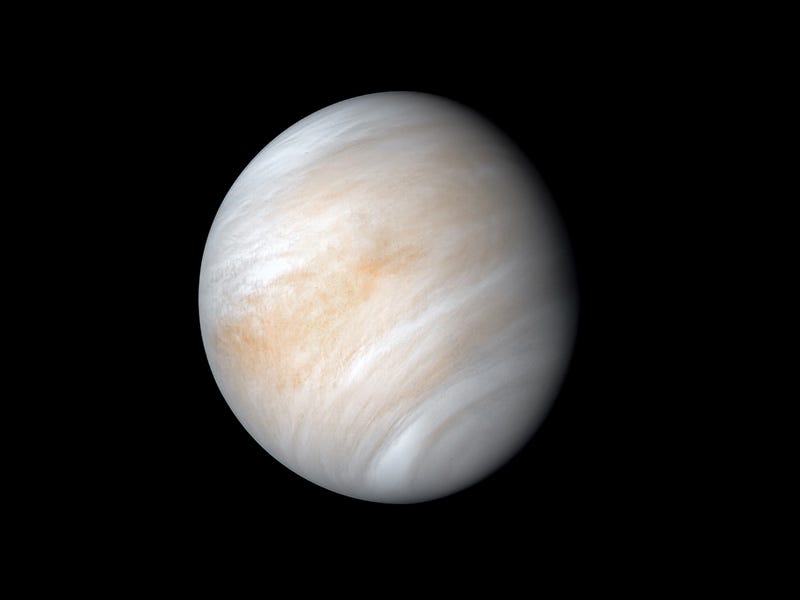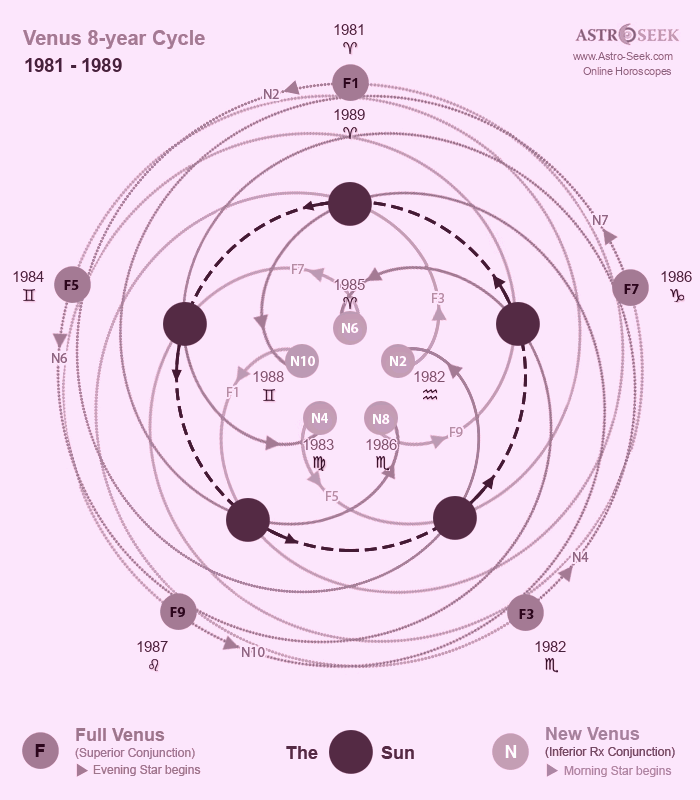Venus in Astrology: The Basics ✨
Exploring the astrological significations of our newsletter's namesake.
Sam: Oh, sweet Venus. Clearly, this dazzling planet means a lot to me and Sterling personally (we did name our newsletter in her honor, after all), but what does she mean astrologically? What are her core significations? Where does she fare best, and where does she struggle? And what insights can we glean from her gorgeously elaborate cycle?
For our first ~official~ newsletter, Sterling and I decided to co-author a primer on Venus, our favorite planet. Over the next few months, we’ll follow suit with a series of explainers on all seven traditional planets (the Moon, the Sun, Mercury, Mars, Jupiter, and Saturn).
There’s a lot of mediocre astrology writing out there. At best, this content is meandering; at worst, it’s flat-out inaccurate. Our aim is to compile information about the foundations of astrology in a digestible, entertaining, and well-researched manner. As this newsletter takes shape, we’ll build on top of it with astrological analysis of topics and cultural artifacts we care about.
Keep reading for the low-down on the Lesser Benefic. (That’s a phrase from the Hellenistic tradition, not our opinion! We love you, queen!)
The Basic Significations of Venus
Sterling: For astrologers, every planet comes with a series of widely used phrases and concepts that help us understand how they function. These significations are a foundation for us to begin understanding the myriad systems they fit into, and how each planet can be expected to “perform” in a birth chart or in transit.
Some of Venus’s basic significations are: beauty, relationships, romance, sensuality, values, harmony, pleasure, appreciation, and money — just to name a few. Venus is one of the zodiac’s modes of femininity*, acting as the core of femininity’s outward expression in the world. Venus shows up in the way a rose blooms, in the way a stranger winks at you, and in the way I appreciate the kitty purring on my lap as I write this. Representing everything from sexuality to values, and all the connected threads between, you may now have a better understanding of why Sam and I refer to Venus lovingly as mother.
* Note that when we discuss topics of “femininity” and “masculinity” in astrology, we are using traditional terms that have been passed down to describe planets and signs for centuries. We are making a deliberate attempt with this newsletter to queer the language of astrology, and as we discuss the concept of femininity in regards to Venus, we speak of it in a spiritual and general sense. We are all children of Venus, regardless of where we fit into the amorphous blob known as gender and gender expression.
Venus’s Cycle
Sam: You can learn a lot about a planet from its motions in the sky. This is especially true for Venus, which, in my humble opinion, has one of the most symbolically rich cycles of them all. But don’t just take it from me: Pallas K. Augustine, an incredible astrologer who works extensively with planetary cycles, agrees that it’s “the most magical and mysterious cycle in astrology.”
Venus has a notable eight-year pattern that’s easily observable from our vantage point on Earth. (This is not to be confused with her synodic cycle relative to the Sun, which lasts just over 19 months.) Over the course of eight years, the planet retrogrades five times for a duration of 40 days*. Depending on where she is in her synodic cycle, Venus will be visible directly after sunset, making her an Evening Star; visible just before sunrise, making her Morning Star; or invisible to us.
Venus forms an exact conjunction to the Sun, or Cazimi, 10 times throughout her eight-year cycle — five while retrograde and five while direct. Mapped out together, the points of these conjunctions form nearly perfect five-point stars every eight years. Seriously, though, take a look at this:
I keep coming back to the imagery above, which absolutely blew my mind when I first listened to The Astrology Podcast’s interview with Arielle Guttman about her research on the Venus Star Point Cycle. It’s so neat and beautiful, it gives me chills.
The pattern reminds me of the Pentagram, another iconic five-point star. Throughout history, witches have used variations of this imagery (including the Pentacle, a five-point star enclosed in a circle) for ritual work and personal adornment. Witches, usually women, have also been systematically persecuted for their craft. The gendered quality of this violence is no accident. I also don’t think it’s a coincidence that the Pentagram is a spitting image of Venus’s five-point star.
If Venus signifies expressions of femininity**, then she also bears witness to the subjugation of femininity under cis-hetero, white supremacist patriarchy. Systemic misogyny, transmisogyny, misogynoir, and even homophobia are all examples of this. To fully understand Venus, we must examine her functions in the broader context of our world. The Venusian impulse to connect is not frivolous; it is a potent survival strategy developed over centuries of oppression. There’s a reason witches form covens, after all. Marginalized people have always found safety and empowerment in community.
* If you, like me, were raised Catholic, “40 days” will ring a bell. It’s the same amount of time Jesus spent starving in the desert and thus the duration of Lent. Coincidence? Maybe not!
** To echo Sterling: We’re both extremely mindful of how we use gendered language to discuss astrology. The “expressions of femininity” I’m referencing here include anything (and anyone) that has historically been oppressed under patriarchy.
Venus’s Planetary Joy
Sam: In traditional astrology, each of the seven visible planets “rejoice” in one of the 12 houses, which represent different areas of life. This doctrine is called Planetary Joys, and it is elegantly illustrated in the Thema Mundi, a theoretical birth chart of the world used as a teaching tool in ancient times.
A quick glance at the Thema Mundi shows Venus rejoicing in the 5th House.
Per Chris Brennan’s Hellenistic Astrology: The Study of Fate and Fortune, ancient astrologers called this house the place of Good Fortune. The astrologer Julius Firmicus Maternus went so far as to say the 5H is called so “because it is the place of Venus.” It’s easy to see the parallels between Venus and the 5H: Both are associated with love, sex, fertility, art, creativity, and general “good-doing.” I like to think that the 5H informs Venus’s vibe, and vice versa.
When I imagine a rejoicing Venus in the 5H, the image that comes to mind is a house mother standing before a veritable pantheon of drag children — a Sasha Colby type, if you will. For her, art and connection are synonymous. She loves generously, for she knows love is generative.
Venus in Domicile
Sam: The planets also have certain zodiac signs where they thrive. Astrologers call this Essential Dignity, and it can be an insightful tool to deepen your understanding of planetary functions and significations.
One form of Essential Dignity is called Domicile, which occurs when a planet is placed in a zodiac sign it rules. Generally speaking, planets in Domicile carry out their responsibilities well because they’re in a comfortable setting. They don’t have to look anywhere else for resources or support.
Venus actually rules two signs: Taurus & Libra. In Taurus, a highly tactile earth sign, Venus experiences pleasure through her senses. She loves cozy sweaters, scented candles, and soothing touch. A decadent bite of perfectly cooked fish followed by a swig of chilled, bone-dry wine — for her, these “little luxuries” are the stuff that make life worth living. Her fixed nature can make her stubborn about her preferences, but let’s be honest…she’s usually on to something. This placement or transit tends to feel like a warm hug from the cosmos.
In Libra, a relationship-oriented air sign, Venus finds pleasure through connections. She is the consummate dinner party host, the linchpin of the literary salon, the taste-making art curator. Thanks to her cardinal nature, she initiates chats at every turn, engaging established friends and (hot) strangers with easy confidence. At times, she may overextend herself to “keep the peace,” but she isn’t afraid to exit a relationship if it no longer aligns with her values. This placement or transit often makes us feel especially sociable or conflict-averse. It’s the astrological equivalent of that first sip of alcohol at the function.
Venus in Detriment, Exaltation, & Fall
Sterling: While there are signs that Venus calls home, there are other signs that can empower (or hinder) her blessings. The concept of Essential Dignity continues with signs that are considered a planet’s Detriment, Exaltation, & Fall.
Starting with Detriment, this is essentially the opposite of a planet in Domicile. While a planet in Domicile has access to all of their most important powers and resources, a planet in Detriment has almost no access to the aforementioned necessities. For Venus’s Detriment, we can look to the signs opposite her homes: Scorpio & Aries. Generally speaking, both Scorpio and Aries are too aggressive and combative for Venus’s liking. Their natures are essentially the opposite of Venus’s, making them less-than-prepared hosts for mother.
In Aries, the fire-starting firstborn of the zodiac, Venus can struggle to express the full width and breadth of her gifts, instead being pulled into a cycle of passionately motivated experiences. Aries is a cardinal fire sign, constantly wishing to prove itself and move through its plethora of ideas as quickly as possible. Venus would rather take her time and smell the roses, enjoying the journey just as much as the destination. Aries can also feel like scorched earth to Venus, who wants to plant and nourish seeds to be harvested in the future.
In Scorpio, Venus’s powers can become bent on obsession and power struggles. Both here and in Aries, Venus has to learn how to navigate a potentially hostile or volatile environment. This makes it difficult for her to bring her blessings to your life, much less express herself fully. Scorpio represents the death station in the cycle of rebirth, which again, lies opposite from her home in Taurus, the sign of life. This can manifest in interesting ways, certainly, but Venus isn’t living her best and cozy life here.
If Domicile and Detriment are one axis in the Essential Dignities of the zodiac, Exaltation and Fall are the other. An Exaltation in astrology is considered by some to be just as powerful, if not more so, as a planet in domicile.
For Venus, its sign of Exaltation is Pisces. Speaking as someone with this natal placement, Venus is LOUD in Pisces. All of the mystical, compassionate qualities about Pisces are expressed through one of the zodiac’s most accessible forms of femininity, and the effect is quite palpable. Venus is *very* happy in Pisces and has access to some of her most profound resources. Even if she’s not technically the Queen here, she is an exceptionally esteemed guest.
On the other side of the zodiac, we find Venus’s Fall in Virgo. Where Venus has a synergistic boost in Pisces’s waters, it can struggle in the zodiacal sign of the harvest. Venus is very familiar with her favorite resort known as Pisces, but Venus in Virgo is akin to someone being dropped in a completely foreign environment for the first time, without any of the bags they just carefully packed. The values of Venus (beauty, pleasure, comfort, etc.) are practically opposite of the values of Virgo (practicality, efficiency, and so on), which can make this placement or transit feel like a tug-of-war.
Sterling: TLDR; Venus is the planet of love, beauty, and values. Her homes are in Taurus and Libra, while she is averse to both Aries and Scorpio. She is exalted in Pisces and has her fall in Virgo. She finds her joy in the 5H, and she represents the core of the cosmic feminine.
She’s queen, she’s mother, she’s beauty, and she’s grace. Venus has served as an inspiration for Sam and I, and we hope we’ve been able to share some of that spark with you. Now go buy yourself some flowers, gorgeous. You’re worth it. 💐
Recommended Resources:
The Astrology Podcast’s episode all about Venus
The Strology Show’s Venus primer featuring Charm Torres & Diana Rose Harper
Pallas K. Augustine’s Venus Cycle and Venus Calculator Guide
Any and all of Arielle Gutman’s groundbreaking work on Venus’s Star Point Cycle
Asteroid Goddesses by Demetra George & Douglas Bloch










